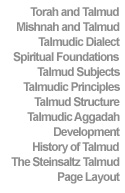






Torah and Talmud
In order to understand
and appreciate the unique nature of the Talmud, one must
first have a clear understanding of the unique Jewish
concept of Torah study, of which studying the Talmud is
a distinctive and characteristic part.
Specifically, the study
of Torah (the Written and Oral Law) can be viewed as a
means to an end. The
Torah consists primarily of laws and commandments, not
all of them easily understandable.
They require elaboration, commentary, and
explanations as to how to fulfill them.
According to this perspective, Torah study
provides the means for learning the principles and
details necessary to fulfill the commandments.
In reality, however,
this view of Torah fails to convey its true purpose and
leaves many things totally unexplained.
In particular, it does not explain why Judaism
developed such great veneration for the study of Torah,
a veneration expressed throughout Rabbinic literature:
“’All things that
may be desired are not to be compared to it [the study
of Torah]’ (Proverbs 8:11).
This means that even the desires of heaven [the
commandments] cannot be compared to it.” (Babylonian
Talmud: Moed Katan 9b.)
“These are the
things, the fruits of which man enjoys in this world,
while the reward remains for him in the World to Come:
honoring one’s father and mother, performing deeds of
kindness, making peace between man and his fellowman.
And the study of Torah is equal to all of
them.” (Mishnah: Pe’ah 1:1.)
To say that “the
study of Torah is equal to all of them” implies that
Torah study is on a higher level than performing the
commandments. It
shows that the importance of Torah study transcends that
of an aid to the fulfillment of the commandments.
Otherwise, we would be faced with a strange
contradiction: If the study of Torah is merely an aid, a
guide to fulfilling the commandments, how can it be more
important than actual performance of the commandments
themselves?
In reality Torah and
its study must be in an entirely different light.
Torah, as its Hebrew
root implies, is a form of הוראה
– teaching. It
teaches man the path he should follow, and is indeed a
guide to fulfilling the commandments.
Yet it is also far more than that.
It is a comprehensive guide, the expression of
Judaism’s conception of everything in the world.
Every subject lies within the compass of Torah,
and Torah tells us how every subject is to be
understood, how we should relate to it and act toward
it. Hence,
whether the subject is concrete and practical or
abstract and spiritual, whether it expresses an
immediate and living need or is entirely theoretical and
without practical application, since it is related to
Judaism’s world view it is related to Torah, and Torah
does indeed deal with it.
Establishing Halakhah
(practical law) and providing guidance in fulfilling the
commandments are only part of Torah.
Torah seeks the essence of all things, in every
area of life. It
embraces the entire world and what lies beyond it.
The ultimate purpose of Torah is not, then, only
to scrutinize the commandments and reach
practical conclusions regarding them; it is,
rather, to provide a comprehensive world view, bringing
out both the essential relationship of Torah to every
subject and also the subjects’ connection with each
other.
If we understand the overall nature and purpose of the Torah, we can then understand and appreciate the special nature of that portion of it known as the Talmud.
Rav Adin Even Israel Steinsaltz

